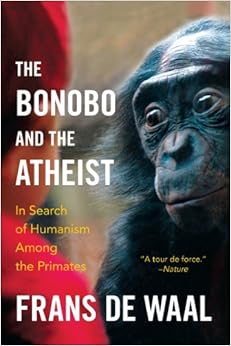This is part of the DR Book Collection.
 I was at the zoo recently with my wife, my sister-in-law, her husband, and their baby. As we looked at the bonobos and observed their eerily human behavior, I made the comment that I needed to read primatologist Frans de Waal’s book The Bonobo and the Atheist: In Search of Humanism Among the Primates. Morality, de Waal argues, is bottom-up. Behaviors we label as “moral”–such as empathy or fairness–are grounded in our evolutionary development. Morality arises from the emotions and social rules that can be found in other primates. The book made Nathaniel’s best of 2015 list. And I happen to agree with one of his criticisms:
I was at the zoo recently with my wife, my sister-in-law, her husband, and their baby. As we looked at the bonobos and observed their eerily human behavior, I made the comment that I needed to read primatologist Frans de Waal’s book The Bonobo and the Atheist: In Search of Humanism Among the Primates. Morality, de Waal argues, is bottom-up. Behaviors we label as “moral”–such as empathy or fairness–are grounded in our evolutionary development. Morality arises from the emotions and social rules that can be found in other primates. The book made Nathaniel’s best of 2015 list. And I happen to agree with one of his criticisms:
Merely because you can show how a thing arises through evolution doesn’t get you out of this problem. You could explain how humans came to have the ability to reason objectively, but that wouldn’t mean that logic and math were suddenly subjective. It would just prove that somehow evolution managed to get us in touch with non-contingent, objective reason. Same idea here: you can explain how humans came to behave morally or even to understand and think about morality, but it’s a colossal mistake to think that, in so doing, you have proved that morality is “constructed” or in any way subjective any more than reason or logic are. (For fun: let someone try to reason you out of the position that reason is objective. See how that works? It’s a non-starter.)
Even if the philosophy is lacking, the science is fascinating. You can see a Big Think interview with de Waal below.
Matt Ridley’s book and de Waal’s have the same problem. They explain the roots of moral behavior and think that this is an explanation of morality. But the two are totally distinct. Morality is “what is right” and moral behavior is “acting in accord with morality.” It’s like the difference between the concept of harmony and the ability to sing in key.
Oddly, once I realized this, I liked both books a lot more than I had before. I get the impression Ridley and de Waal are confused, themselves, about the difference but once you see it clearly you can take the books for what they are: great evolutionary psychology and anthropology, but not great philosophy.
(FYI, I fixed a typo in the post. It was in the part you quoted from my book review, so it was my typo. Oops.)
Thank you for explaining that you corrected the typo in the quote. I was struggling with the concept in Walker’s post until I realized that it must have been an error.
DEEP DOCTRINE ALERT!
Assuming Morality is objective, and animals such as chimpanzees, dolphins, dogs, etc. are intelligent enough to discern and choose between what is moral and immoral (if even on a rudimentary level), does this mean that their choosing immorality constitutes sin? If so, do they need to repent?
There is enough Youtube evidence out there of dogs behaving with what looks pretty much like guilt and then engaging in behavior of reconciliation to the one offended. Is this a form of dog repentance?
By asking this, I don’t want to make light of what, for me, is a very sacred thing, but it begs the question. (Or does it raise the question? Help me, Nathaniel :-) )